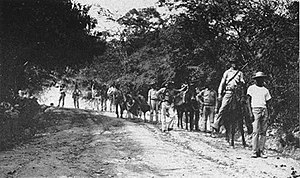The Banana Wars
| Banana Wars | |
|---|---|
 United States Marines and a Haitian guide patrolling the jungle in 1915 during the Battle of Fort Dipitie |
|
| Objective | Protect United States interests in Central America |
| Date | 1898–1934 |
| Executed by | United States |
| Outcome | |
Banana Wars is the term used by some historians since it was coined in 1983 to refer to the occupations, police actions, and interventions on the part of the United States in Central America and the Caribbean between the end of the Spanish–American War in 1898 and the inception of the Good Neighbor Policy in 1934. These military interventions were most often carried out by the United States Marine Corps, which developed a manual, The Strategy and Tactics of Small Wars (1921) based on its experiences. On occasion, the Navy provided gunfire support and Army troops were also used.
With the Treaty of Paris, Spain ceded control of Cuba, Puerto Rico, and the Philippines to the United States. Thereafter, the United States conducted military interventions in Cuba, Panama, Honduras, Nicaragua, Mexico, Haiti, and the Dominican Republic. The series of conflicts ended with the withdrawal of troops from Haiti in 1934 under President Franklin D. Roosevelt.
US motivations for these conflicts were largely economic and military. The term "Banana Wars" was coined much later to cast the motivations for these interventions as almost exclusively the preservation of petty US commercial interests in the region.
...
Wikipedia
